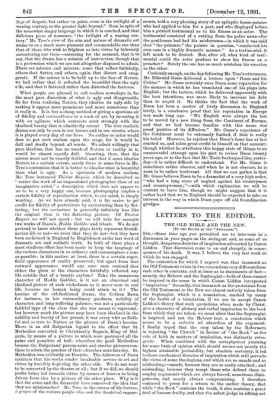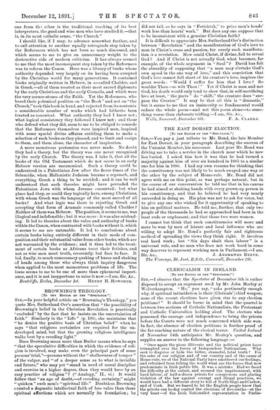LETTERS TO THE EDITOR.
THE OLD BIBLE AND THE NEW.
[To THE EDI COB OF THE " SPECTATOE."] SIR,—Some time ago you permitted me to intervene in- a discussion in your pages on the stringent and, as some of us- thought, dangerous doctrine of inspiration advocated by Canon Liddon. That discussion came to an end abruptly, in conse- quence of his death. It was, I believe, the very last work on which he was engaged.
The contention for which I argued was, that inasmuch as the Old Testament exists in two rescensions very different from each other in contents, and at issue as to statements of fact— namely, the Hebrew and the Septuagint—both of them cannot be inspired in the sense in which Canon Liddon interpreted "inspiration." Secondly, that inasmuch as the quotations from the Old Testament in the New are almost entirely taken from the Septuagint, which is a translation, marked by many of the faults of a translation, if we are to accept Canon Liddon's theory that such quotations, when made by Christ, give a character of plenary and verbal inspiration to the book from which they are taken, we must allow that the Septuagint is inspired, and not the Hebrew text, a conclusion which seems to be a reductio ad absurdum of the argument. I finally urged that the step taken by the Reformers in rejecting "the Church" in favour of "the Book" as the rule of faith in matters of inspiration, was distinctly retro- grade. When combined with the metaphysical yearning for some basis of opinion which should secure not merely the highest attainable probability, but absolute certainty, it led to those mechanical theories of inspiration which still pervade the views of some theologians, and which are so unsafe and so misleading,—unsafe, because they are so easily attacked ; and misleading, because they tempt those who defend them to employ arguments which are always forced, sometimes disin- genuous, and nearly always compromising. I therefore ventured to press for a return to the earlier theory, that while "the Book" contains the truth, it also contains a great , deal of human frailty, and that the safest judge in sifting out one from th3 other is the traditional teaching of its best interpreters, the good and wise men who have studied it,—that is, in its most catholic sense, "the Church."
I should like, if I may, to advance somewhat further, and to call attention to another equally retrograde step taken by the Reformers which has not been so much discussed, and which seems to me to give an unnecessary weight to the ,destructive side of modern criticism. It has always seemed to me that the most inconsequent step taken by the Reformers was to reform the Canon. Here was a library of books whose authority depended very largely on its having been accepted by the Christian world for many generations. It contained books originally written in Hebrew, in so-called Chaldee, and in Greek,—all of them treated as their most sacred diplomata by the early Christians and the early Councils, and which were the very corner-stones of the Faith. Yet the Reformers, who based their polemical position on "the Book" and not on "the Church," took this book in hand, and rejected from its contents a considerable number of works which had hitherto been treated as canonical. What authority they had I know not ; what logical consistency they followed I know not ; and those who defend what they did, seem to me to be obliged to concede that the Reformers themselves were inspired men, inspired with some special divine afflatus entitling them to make a selection of such books as they pleased, and to limit and assign to them, and them alone, the character of inspiration.
A more monstrous pretension was never made. No doubt they had a theory, but the theory was one never recognised by the early Church. The theory was, I take it, that all the books of the Old Testament which do not occur in an early Hebrew version are uncanonical. Such a theory could be understood in a Palestinian Jew after the fierce times of the Seleacidw, when Hellenistic Judaism became a reproach, and everything Greek a thing to be avoided ; and it can be well understood that such theories might have pervaded the Palestinian Jews with whom Jerome consorted ; but what place had they, or could they logically have, among Christians, with whom Greek was the language of the most sacred of all books ? And what logic was there in rejecting Greek and accepting that form of Aramaic commonly called Chaldee ? Neither of them was Hebrew. The position, it seems to me, was illogical and indefensible ; but it was more : it was also mislead- ing. It led to theories about the value and authority of books within the Canon, when contrasted with books without it, which it seems to me are untenable. It led to conclusions about certain books being entirely different in their mode of com- position and their substantial value from other books, which are not warranted by the evidence ; and it thus led to the treat- ment of certain books as Africans treat their fetishes, and not as wise men meet truth, reverently, but face to face. It led, finally, to much unnecessary quaking of knees and shaking -of heads among those who always think inquiry dangerous when applied to the most momentous problems of life. The issue seems to me to be one of more than ephemeral import- ance, and it is not inopportune to raise it now.—I am, Sir, &c., Bentcliffe, Eccles, December 1st. HENRY H. HOWORTIL











































 Previous page
Previous page